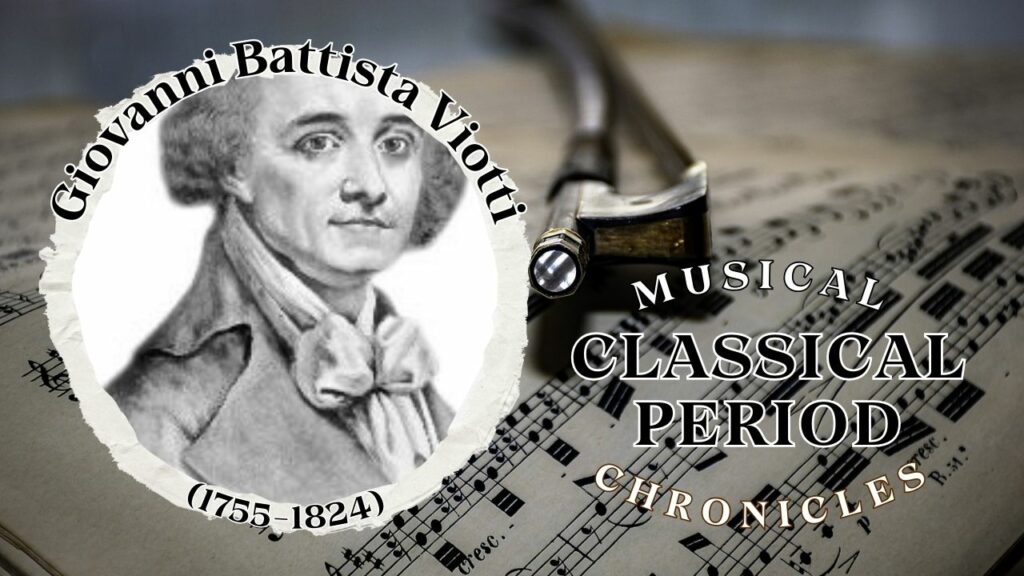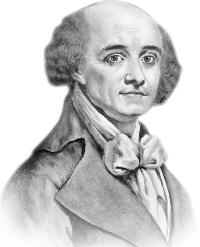
Giovanni Battista Viotti (1755-1824)
The Elusive Quest for Connection: Viotti’s Unspoken Struggle
Giovanni Battista Viotti, a maestro known for his violin virtuosity, hides a profound and solitary struggle beneath his captivating performances. Behind the dazzling facade of his music lies a relentless quest for connection, an unspoken yearning that echoes through the corridors of his mind.
As Viotti continues to enthrall audiences with his mesmerizing compositions, the deeper currents of his personal life remain shrouded in mystery. Unbeknownst to many, the celebrated virtuoso battles with the haunting shadows of isolation, seeking solace in the very art that catapulted him to fame.
In the grand theaters where his violin weaves intricate tales, Viotti grapples with an existential dilemma—a yearning for meaningful human connection that remains as elusive as the notes he coaxes from his instrument. This internal struggle, masked by the brilliance of his performances, adds a poignant layer to the narrative of his life.
Despite the applause and acclaim that follow him on stage, Viotti’s quest for connection transcends the boundaries of the concert hall. His music, though a beacon of artistic brilliance, becomes a silent plea for understanding, an endeavor to bridge the gap between the solitary artist and the world that gazes upon him.
In the upcoming episodes, we delve into the depths of Viotti’s intricate web of emotions, exploring the complexities that underscore his journey as a musician and a man in search of connection. The resonance of his struggle echoes through the annals of musical history, inviting us to unravel the enigma of Giovanni Battista Viotti.
Giovanni Battista Viotti: Strings of Destiny Unveiled

In the quaint town of Fontanetto Po, nestled in the picturesque landscapes of Piedmont, Italy, a prodigious talent was born on May 12, 1755—Giovanni Battista Viotti. From the cradle, Viotti seemed destined for greatness, showcasing an innate affinity for the violin that would shape the course of his life.
Viotti’s early years unfolded in an atmosphere of artistic nurture, marked by an innate curiosity and an insatiable appetite for music. As a child prodigy, he captured the attention of local musicians and patrons with his remarkable dexterity on the violin. Recognizing his extraordinary potential, Viotti’s talent attracted the patronage of the wealthy Viotti family, providing him with the means to pursue a formal musical education.
The young virtuoso’s journey led him to Turin, where he studied under the renowned musician Gaetano Pugnani. Under Pugnani’s guidance, Viotti honed his technical prowess and delved into the nuances of composition. Turin became the crucible of Viotti’s artistic identity, shaping the foundations of the style that would later captivate audiences across Europe.
Embarking on a series of musical sojourns, Viotti’s travels took him to Paris, a city that would become a focal point for his artistic evolution. In the vibrant cultural milieu of late 18th-century France, Viotti found inspiration that fueled his creative spirit. His performances in the salons of Parisian aristocracy elevated him to the status of a virtuoso, with his name becoming synonymous with elegance and sophistication.
Viotti’s artistry extended beyond the confines of solo performances, as he delved into the realm of composition. His violin concertos, in particular, showcased a melodic richness and emotional depth that set them apart. The influence of Viotti’s compositions rippled through the classical music landscape, leaving an indelible mark on the genre.
However, amidst the applause and adulation, Viotti grappled with an internal struggle—the elusive quest for connection. The very art that brought him acclaim also served as a refuge from the profound loneliness that lingered within. His personal life, characterized by fleeting relationships and unspoken yearning, added a layer of complexity to the narrative of his artistic journey.
As Viotti’s musical odyssey unfolded, the interconnected threads of his life and art wove a tapestry of triumphs and tribulations. In this episode, we will unravel the intricate layers of Giovanni Battista Viotti’s existence, exploring the enigmatic fusion of brilliance and solitude that defined his legacy.
Breaking News: Viotti’s Audacious Experiment Causes Uproar!
We interrupt this program for an important announcement.
In a shocking turn of events, renowned composer Giovanni Battista Viotti’s latest avant-garde composition has triggered an intense public reaction. The experimental piece, known for its radical departure from conventional musical structures, has ignited a fierce debate among music aficionados and critics alike.
Reports suggest that Viotti’s daring collaboration with a controversial poet has not only challenged the boundaries of traditional composition but has also led to protests and heated discussions. Some applaud the innovative approach, hailing it as a bold step into the future, while others vehemently reject the departure from established norms.
As the controversy rages on, music enthusiasts are left questioning the very fabric of classical composition, wondering whether Viotti’s audacious experiment will mark a paradigm shift or stand as a divisive moment in musical history. Stay tuned for more updates on this unfolding cultural phenomenon.
Now back to the program, on hold until you return.
Harmonies Beyond Borders: Viotti’s Musical Odyssey Unveiled
As the sonorous echoes of Viotti’s violin resonated through the salons of Paris, a transcendent journey unfolded—one that traversed geographical boundaries while etching indelible imprints on the annals of classical music history.
Viotti’s arrival in Paris marked a turning point in his artistic trajectory. The city, teeming with intellectual fervor and artistic vibrancy, embraced Viotti with open arms. His performances at the Concert Spirituel, one of Paris’s foremost musical institutions, elevated him to the echelons of musical stardom. The vibrant cultural tapestry of Paris became the backdrop against which Viotti’s compositions flourished, resonating with an audience eager for innovation and refinement.
The Maestro’s collaboration with fellow luminaries like the renowned opera composer Luigi Cherubini added new dimensions to his artistic palette. Viotti’s contributions to the operatic repertoire, including the opera “L’ile Inconnue,” further underscored his ability to navigate diverse musical genres with unparalleled finesse.
Beyond the Parisian salons, Viotti’s influence rippled across Europe. From London to Berlin, the virtuoso embarked on concert tours that showcased the universality of his art. His performances in these cosmopolitan hubs solidified his reputation as a musical luminary, transcending borders and cultural divides.
However, surrounded by the acclaim and the adoration of European audiences, Viotti’s personal life remained a tapestry woven with threads of solitude. The complexities of his relationships, marked by fleeting connections and unspoken yearning, added a poignant layer to the narrative of his musical odyssey.
Viotti’s return to Italy in 1792, against the backdrop of political upheaval, signaled a new chapter in his life. The Maestro’s decision to embrace an itinerant lifestyle, fueled by wanderlust and a quest for artistic exploration, mirrored the tumultuous times in which he lived. His compositions, imbued with a sense of longing and introspection, echoed the shifting landscapes of both his personal and historical milieu.
As Viotti continued to traverse the European continent, his collaborations with fellow musicians—such as the celebrated pianist and composer Muzio Clementi—added further depth to his creative repertoire. The interplay of Viotti’s violin and Clementi’s piano became a harmonious conversation that resonated across concert halls, leaving an indelible imprint on the evolving soundscape of classical music.
In Viotti’s unwavering pursuit of musical excellence, we witness not only the virtuosity of a violin maestro but also the unfolding of a narrative that transcends borders and epochs.
Cadenza’s Farewell: The Final Refrain of Viotti’s Symphony
The final notes of Giovanni Battista Viotti’s virtuoso performance lingered in the air, creating a palpable atmosphere of anticipation and retrospection. The illustrious maestro, known for his masterful strokes across the strings, was more than a musician; he embodied an era of musical fervor and financial intricacies.
Viotti’s journey through the courts of Europe, from Turin to Paris, traced the contours of a life set to the tempo of acclaim and financial discord. The grandeur of his performances resonated through opulent halls, where aristocrats and music aficionados alike reveled in the spellbinding cadence of his violin. Yet, beneath the veneer of adulation, Viotti grappled with the perennial challenge faced by many artists—the delicate balance between artistic pursuit and the relentless demands of financial stability.
As Viotti’s music soared, the strains of financial discord formed an underlying motif, weaving through the fabric of his life. The maestro, despite his unparalleled talent, found himself entangled in a complex symphony of debts and financial setbacks. The exigencies of Viotti’s reality underscored the dichotomy inherent in the lives of artists during the classical era—an era where artistic brilliance often coexisted with financial precarity.
In this movement of our exploration, Viotti takes his final bow. The curtain descends on the stage he graced, leaving behind an indelible imprint on the classical overture. The audience, both then and now, bears witness to the poignant resolution of Viotti’s symphony—one that encapsulates the triumphs and tribulations of a maestro navigating the complex interplay of art and finance.
With Viotti’s cadenza reaching its conclusion, we pivot toward a new chapter—a sonata composed by the enigmatic Franz Xaver Süssmayr. Stepping into the limelight, Süssmayr inherits the thematic resonance of Viotti’s financial struggles, poised to embark on his own melodic journey. The transition from Viotti to Süssmayr mirrors the seamless evolution of classical music, where one maestro’s final note becomes the prelude to another’s enthralling composition.
As the viottiad reaches its final bars, the curtain falls, and the audience prepares for the next movement in our symphonic exploration—an episode dedicated to unraveling the complexities and nuances of Süssmayr’s contribution to the classical tapestry. The orchestral saga continues, each movement building upon the echoes of its predecessor, creating a harmonious continuum in the grand composition of musical history.
Return to the Classical Period Chronicles home page.
